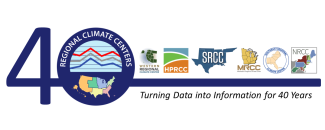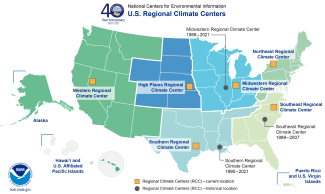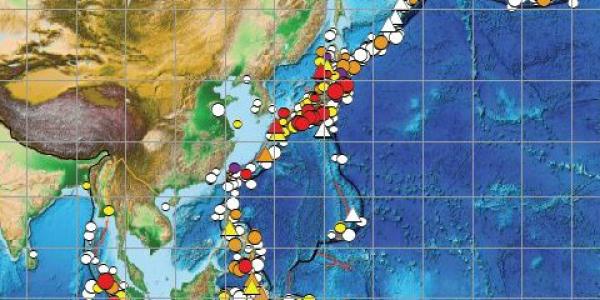A Brief History

In honor of the 40th anniversary of the Regional Climate Center Program, we will be producing a series of news stories highlighting the program’s accomplishments. In this first installment, we will look back at the early days of the program and offer a vision for the future. Upcoming stories will feature partnerships, sectoral engagement, and the Applied Climate Information System.
Origins of the Program
The Regional Climate Center (RCC) Program was formed in 1983 in response to the National Climate Program Act of 1978, which recognized the need for accurate, localized climate information to support government decision-makers and other stakeholders. This came on the heels of the creation of the Environmental Protection Agency (EPA), the Environmental Science Services Administration (ESSA), and its successor agency NOAA, and a growing interest in applied climatology owing to factors such as the globalization of the agricultural economy and the impacts of major climate events around the world.
The RCC Program started as demonstration projects, which stemmed from independent concepts developed by two regional agricultural committees based in the north-central and northeastern parts of the country. The north-central demonstration project, based at the Illinois State Water Survey, covered the 12-state region of Illinois, Indiana, Iowa, Kansas, Michigan, Minnesota, Missouri, Nebraska, North Dakota, Ohio, South Dakota, and Wisconsin; while the northeast demonstration project, based at Cornell University, included the seven states of Connecticut, Maine, Massachusetts, New Hampshire, New York, Rhode Island, and Vermont.
These projects, along with a prototype for a climate information system at the University of Nebraska-Lincoln, became the foundation for the development of what we know today as the RCC Program. After these demonstration projects proved that the provision of climate services could be coordinated on a regional level, the RCC Program began to be formalized. By 1990, all six RCCs had been established and funded through NOAA (see timeline for individual start dates), collectively covering the entire United States.
More details about the early years of the Regional Climate Center Program may be found here.
About the Program
Since inception, the RCC Program has been at the cutting edge of the rapidly expanding field of climate information and service delivery. Its work is grounded in a combination of infrastructure, outreach, applied research, and operational services. Other regional service providers have been established over the years, with a primary focus on climate adaptation; however, the RCC Program is the only existing program that covers such a significant breadth of climate services for all 50 states and U.S. Territories.
|
As operational climate service providers, the RCCs fill three main niches:
|
Individual RCCs work with public and private partners and stakeholders of any sector to understand regional climate-related needs and address them through the development of value-added decision-support information and tools. Examples of decisions that RCC tools support include determining planting dates for various crops, calculating shipping loads for trucks and barges, deciding when to scout for pests, and declaring drought. Over time, due to the nature of regional variations in the climate, landscape, and economy, each RCC has come to specialize in various sectors. For instance, the High Plains and Midwestern RCCs have a thematic focus on agriculture and water resources, while the Southeast RCC has a focus on heat and public health. The Northeast, Southern, and Western RCCs also focus on water resources, along with resilience to extreme events (NRCC), coastal resiliency (SRCC), and wildland fire and coastal and ocean resources (WRCC).
The RCCs also support general regional climate and drought monitoring through various tools, reports, and outreach activities. By actively engaging in climate and drought monitoring, individual RCCs have the flexibility to immediately address regional climate-related issues as they arise. This has led to an efficient and nimble service delivery framework. More details about the services the RCC Program provides will be found in an upcoming news story.
Looking Toward the Future
Climate services are a rapidly evolving landscape, and as new challenges arise, the RCC Program will continue to provide cost-effective, efficient climate services that are needed to support complex decision-making, streamline climate and drought monitoring, and support research at the regional level.
In the near-term, the RCC Program will focus on a number of enhancements to its current line of products and services, such as the integration of additional data sources and the development of a more user-centric experience with customizable features. It also will continue to deepen relationships with regional partners and stakeholders to ensure the development and delivery of relevant sectoral services. As the need for climate services continues to grow, the RCC Program will remain the technological leader for provision of essential climate information and products for every corner of the United States.
Learn More About Your Regional Climate Center
- High Plains Regional Climate Center, University of Nebraska-Lincoln, Lincoln, NE
- Midwestern Regional Climate Center, Purdue University, West Lafayette, IN
- Northeast Regional Climate Center, Cornell University, Ithaca, NY
- Southeast Regional Climate Center, University of North Carolina at Chapel Hill, Chapel Hill, NC
- Southern Regional Climate Center, Texas A&M Transportation Institute, College Station, TX
- Western Regional Climate Center, Desert Research Institute, Reno, NV
NCEI’s Regional Climate Services
The RCCs are supported by the National Centers for Environmental Information (NCEI) as part of a three-tiered approach to climate services, which includes state, regional, and national partners. The RCCs work alongside six Regional Climate Services Directors that, together, comprise NCEI’s Regional Climate Services.





